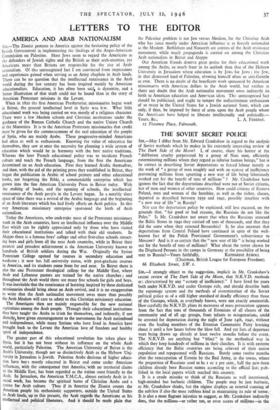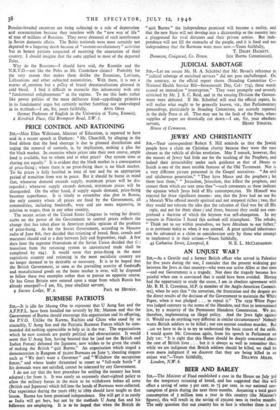Snt,—I strongly object to the suggestion, implicit in Mr. Crankshaw's
recent review of The Dark Side of the Moon, that N.K.V.D. methods are characterised by any " ecstady of inefficiency." I have lived for years both under N.K.V.D. and under Gestapo rule, and should describe both the espionage system and the methods of extermination of the Soviet political police as of- a still higher standard of deadly efficiency than those of the Gestapo, which, as everybody knows, were not exactly amateurish. How carefully the N.K.V.D. plans its measures of mass persecution appears from the fact that tens of thousands of Estonians of all classes of the community and of all age groups, from infants to octogenarians, could be arrested for deportation during the night of June 14th, 1941, without even the leading members of the Estonian Communist Party learning about it until a few hours before the blow fell. And yet lists of deportees were being drawn up already at least twelve months before the event., The N.K.V.D. are anything but " blind " in the methodical way in which they keep hundreds of millions in their clutches. It is with extreme efficiency that the Baltic countries are being relieved of their native population and repopulated witli Russians. Barely some twelve months after the reoccupation of Estonia by the Red Army, in the towns, where the proportion of Russians used to be bet or 2 per cent., half the new-born children already bore Russian names according to the official lists pub- lished in the local papers which reached this country.
It is a crude mistake to think of the Russians as well intentioned, high-minded but barbaric children. The people may be just barbaric, as Mr. Crankshaw thinks, but the regime displays an oriental cunning of the subtlest if also the most ruthless kind in maintaining its rule of terror: It is also a most flagrant injustice to suggest, as Mr. Crankshaw indirectly. does, that the millions—or rather ten, or even scores of millions—in the
Russian-invaded countries are being subjected to a rule of deportation and extermination because they interfere with the " new way of life " of tens of millions of Russians. They never dreamed of such interference in Soviet domestic affairs. The Baltic nationals were most certainly not deported to a lingering death because of " counter-revolutionary " activities but as honest patriots suspected of resenting the annexation of their country. I should imagine that the same applied to most of the deported Poles.
Why do the Russians—I should have said, the Kremlin and the N.K.V.D.—not like the Poles as Mr. Crankshaw claims? Probably for the very reason that makes them dislike the Estonians, Latvians, Lithuanians and other subjected nationalities. With them, it is not a matter of, emotion but a policy of brutal denationalisation planned in cold blood. I find it difficult to reconcile this inhumanity with any " fundamental enlightenment " in the regime. To me this looks rather like power politics of the most deliberate kind—appallingly primitive in its fundamental urges but certainly neither fumbling nor undeveloped
in its methods.—I am, Sir, yours faithfully, ANTS ORAS (former Professor of English in the University of Tartu, Estonia). 2 Kendrick Place, Old Brompton Road, S.W. 7.































 Previous page
Previous page